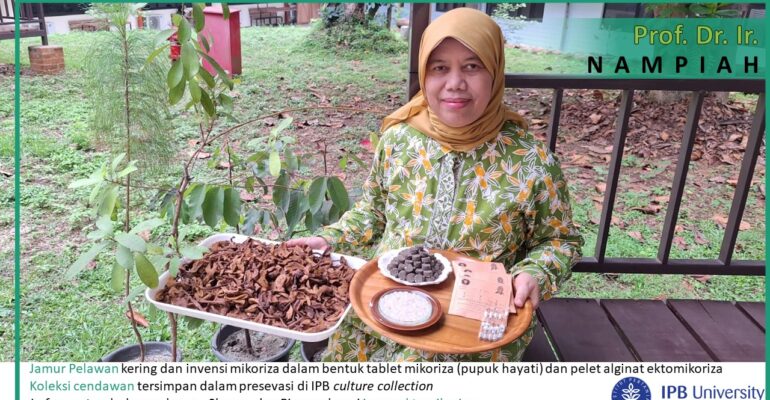Prof Nampiah Sukarno Reveals the Benefits of Fungi in the Fields of Forestry, Agriculture and Health

Professor of IPB University, Prof Nampiah Sukarno explained that fungi are microorganisms that can change the world by maintaining the survival function of various organisms and the balance of nature. Most fungi live as saprobes by breaking down complex organic matter into simple compounds that can be absorbed by plants, so that the cycle of nutrients on earth runs smoothly.
In his presentation, he explained that there are around 1.5 million species of fungi in the world, but only 5 per cent have been identified and explored, including in Indonesia.
“Exploration of fungi from various terrestrial and aquatic ecosystems in Indonesia has a great opportunity to get new species (species novelty) which is a source of new bioactive ingredients (novel compounds) with important economic value,” he said in a press conference on Thursday, 23/11.
The Professor of the Faculty of Mathematics and Natural Sciences said that the results of the exploration of terrestrial soil fungi from various habitats in Indonesia show that the diversity of fungi in Indonesia is very high (megabiodiversity), estimated 27 per cent of the fungi are new species.
“Other terrestrial fungi are mycorrhizal fungi. Mycorrhiza is a mutualistic symbiosis between fungi and plants that can be used as a biofertiliser. Mycorrhizae can also increase plant diversity,” said Prof Nampiah.
He continued, in this symbiosis the fungus gets carbon elements from the host plant, while the host plant gets nutrients and water absorbed by the fungus mycelia from the soil. Mycorrhizae commonly found in Indonesia are ectomycorrhizae and arbuscular mycorrhizae (MA).
“Unlike ectomycorrhizal fungi, MA fungi cannot grow on artificial media such as PDA (Potato Dextrose Agar) and only grow on living roots. In agriculture, MA plays a significant role in increasing rice productivity both in monoculture and intercropping with onions,” explained Prof Nampiah.
The lecturer of the Department of Biology said, apart from land ecosystems, fungi also play an important role in seawater ecosystems (aquatic fungi) by living freely or symbiotically with various marine organisms.
“The results of the study of the diversity of sponge-associated marine fungi show that the diversity of marine fungi in Indonesia is high and interesting to study. 179 isolates were obtained from 20 samples of tropical sponges collected from Pramuka Island, Kepulauan Seribu, DKI Jakarta, consisting of 21 species.”
He revealed that to maintain the variety of fungi in the forest, conservation must be done wisely and plants should not be harvested excessively because they are useful as hosts for plants in the forest.
“There are many benefits of fungi for human and animal life, such as food such as tempeh, tauco, soy sauce and so on. In animals, fungi are useful, one of which is to treat worms in sheep and become a source of symbiosis between fungi and animals in the forest,” he said. (Lp) (IAAS/RUM)



